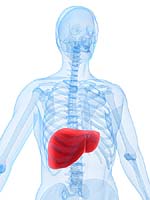| Home A B C D E F G H I J K L M N O P Q R S T U V W X Y Z |
|
Home |
Jaundice: Symptoms and Causes
Yellow eyes may be nice to look at in this day of multi-colored contact lenses. But if your eyes are naturally yellow, that's another story. You may have jaundice. Yellowing of the whites of the eyes is a sign of jaundice, which may be brought about by diseases of the liver, gallbladder or blood. This is caused by too much bile pigment bilirubin in the blood either because of the body's faulty excretion or absorption. It may be accompanied by itching, yellow skin, dark urine and light stools. Jaundice may be caused by a diseased or damaged liver, which affects the normal secretion of bile pigment. The flow of bile from the liver to the intestines may be blocked by gallstones, tumors or parasites. This type of jaundice is characterized by clay-colored stools and light yellow or brownish-green urine. The liver is enlarged in this case and could be damaged unless the obstruction is removed. "Infectious diseases such as malaria and pneumonia cause jaundice. They may damage the blood, excessively destroying blood cells whose pigment may be deposited in the tissues. Other causes include chemical poisoning — resulting from the absorption or inhalation of toxic substances such as arsenic and phosphorus which attack the liver cells — and infections which affect the rate of destruction of the blood cells," said the late Dr. Morris Fishbein in his Popular Illustrated Medical Encyclopedia. Other conditions that give rise to jaundice are hepatitis and cirrhosis. Catarrhal jaundice, which is caused by a viral infection, is common in the young. Some babies are jaundiced at birth while others develop it during the first few days of life. This shouldn't alarm parents except when the problem persists. "Infant jaundice itself isn't a disease. In most cases infant jaundice occurs because your baby's liver isn't mature enough to metabolize a molecule called bilirubin, which normally forms when the body recycles old or damaged red blood cells," explained the Mayo Clinic. "Infant jaundice usually isn't a cause for alarm. It doesn't cause discomfort for your baby, and it usually disappears on its own in one to two weeks. Still, infant jaundice should be closely monitored by your baby's doctor because severe jaundice can lead to serious complications. Treatments can help keep your baby's blood level of bilirubin from becoming too high," the Mayo Clinic added. In babies, jaundice usually starts in the face and spreads to the chest, abdomen, and legs. This may last for a week to 10 days or longer in premature infants and in breast-fed babies. "Left untreated, severe jaundice can lead to a rare, but very serious, condition called kernicterus (hyperbilirubinemia). With kernicterus, extremely high levels of bilirubin can cause damage to a newborn's brain and may lead to deafness, severe developmental disabilities and an unusual form of cerebral palsy. Prompt treatment of jaundice can keep kernicterus from developing," said the Mayo Clinic. To find out what your problem is and avoid complications, see a doctor as soon as possible. To strengthen your body, take Immunitril — your first line of defense in maintaining a healthy immune system. About The Author: |
|
|
|
|
|
Glossary References Links Contact
|